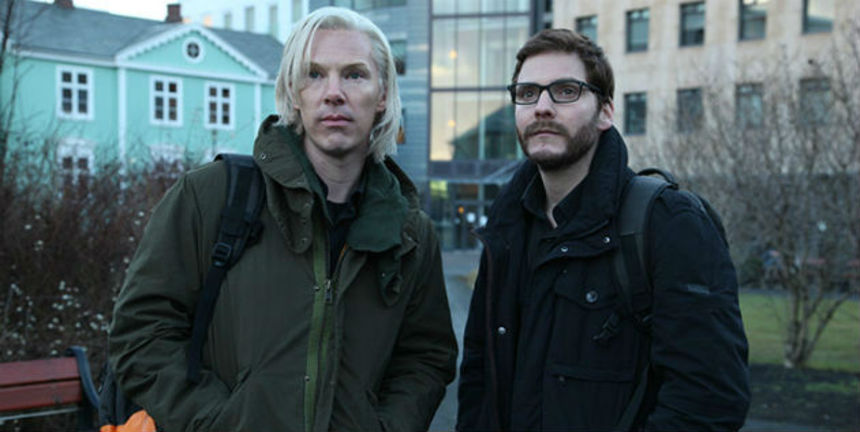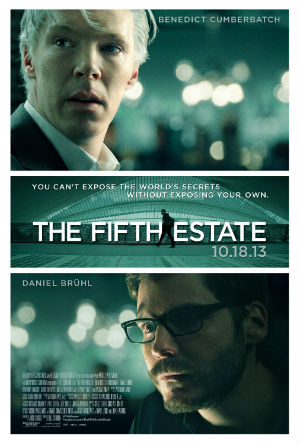Review: THE FIFTH ESTATE Showcases Benedict Cumberbatch And Little Else

The real draw for The Fifth Estate isn't the drama surrounding it but the enticing and almost albino-like visage of Benedict Cumberbatch railing in an Aussie accent about truth, justice, and the "mainstream media".
If casting accomplishes much of the heavy lifting of any good work, then director Bill Condon at least did this part right. As Wikileaks founder Julian Assange, Cumberbatch is excellent as always, making even the most awkward of prose presentable within the context of the narrative. It took a while for me to accept Daniel Brühl with a beard, but he too does an admirable job in an even more structured role, his character often providing little more than emotional beats or expositional narration.
I admit it's unfair to completely slam a film that tries to speak to both the masses and those who had actually heard of the site before the Manning files were released, but the film's visualization of data, of networks, even of so-called "hacking" seems already patently dated. I can't provide better ways that such elements can be incorporated, except to say that in David Fincher's b>The Social Network the milieu of the desperate and sleep-deprived programmer seemed mildly believable, whereas here I simply couldn't suspend disbelief when talk turned to FFMpeg and Final Cut as a way to enhance images, while they're sitting in front of Dell machines, some running Windows XP.
Nerdy, yes, but also lazy and, frankly, inexcusable. This isn't quite the "Unix, I know this!" from Jurassic Park, or Sandy Bullock traipsing through 1995's The Net, but we shouldn't have to see Matrix-like desks with batches of Cumberbatch in order to visually represent how computer networks operate. There's loads of inherent drama in a story that's shirked off to brief asides or foggy flashbacks, while the more bureaucratic elements, such as story meetings at a newsroom, are treated with a somber-scored gravitas normally reserved for invasion talk in the White House situation room.
More tedious are scenes of flying text chat sessions and dreary voice-overs, as two men sit across from a table IRC'ing to maintain some level of security. The visual flourishes don't help, they hinder, and frankly will inevitably date the film even more prematurely, save for only the most Luddite of viewers.
 In fairness, the film does manage to have Assange's character come across as slightly more than the two-dimensional figure he's often portrayed as. There's merit to some of his madness, to be sure, and the Joker-like, "how did I get this scar?" discussion about his white hair was an interesting touch for the audience to speculate upon before the film made a declarative statement about the facts of the matter.
In fairness, the film does manage to have Assange's character come across as slightly more than the two-dimensional figure he's often portrayed as. There's merit to some of his madness, to be sure, and the Joker-like, "how did I get this scar?" discussion about his white hair was an interesting touch for the audience to speculate upon before the film made a declarative statement about the facts of the matter.
Whether factually true or not, on a cinematic level it does little to make us feel one way or another about our characters, and this is the flaw that runs throughout the film. With needless sidesteps to fictionalized rescues from Libya, through to a closing, highly self-referential scene, it all feels forced, lacking any dramatic or narrative subtlety, bludgeoning the viewer with one rote scene after another.
I guess it all comes down to what one comes to a Wikileaks movie about in the first place. As the film admonishes at the end, if you want the "facts", you're encouraged to go find them out yourselves. As an introduction to the events that led to the rise of the site, the film may be simplistic and overly contrived, but it may in fact spark some discussion by those who are only aware of the white-haired man's notoriety.
It still can be considered frustrating that the movie leaves plenty of meat on the bone - there are brief teases on the end credits text to some of the more sordid parts of the story, including the reasons for Assange's extended stay at the Ecuadorian embassy in London and the entire Manning trial, and despite many attempts doesn't go nearly far enough to get to the heart of the cult of personality of Assange that developed, as well as the swirls of hypocrisy on so many more levels that have come to the forefront since the events in the film took place.
Still, I'm over-thinking a film that, frankly, doesn't particularly warrant it. The Fifth Estate proves little more than a showcase for the acting talents of a supreme mime in the form of the lanky Cumberbatch. And despite some florid and at times annoying flourishes, Condon manages to showcase enough of this performer in a positive and compelling enough way that it's sure to get its share of attention come awards season.
Review originally published in somewhat different form during the Toronto International Film Festival in September 2013. The films opens in wide release in North America on Friday, October 18.







